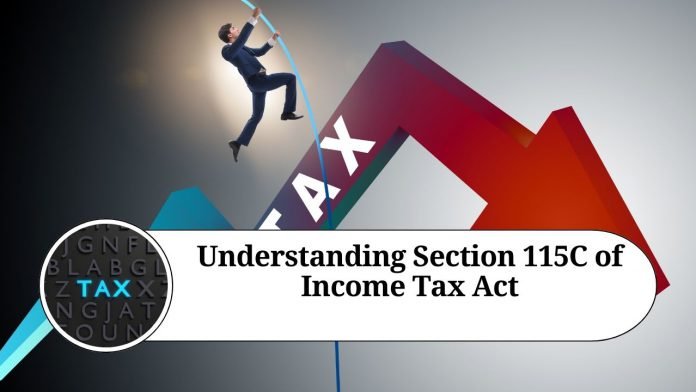Section 115C of the Income Tax Act is a key part of Chapter XII-A, which lays out special provisions for the taxation of Non-Resident Indians (NRIs). These provisions offer NRIs favorable tax treatment for certain types of income, such as investment income and long-term capital gains from assets acquired using foreign exchange. To fully understand the benefits under this chapter, it’s essential to grasp the definitions outlined in Section 115C, which form the foundation of the taxation rules for NRIs.

Key Definitions Under Section 115C of the Income Tax Act
1. Convertible Foreign Exchange
Convertible foreign exchange refers to foreign exchange recognized by the Reserve Bank of India (RBI) as convertible under the Foreign Exchange Management Act, 1999. In simpler terms, it is foreign currency that can be freely converted to Indian rupees. The income derived from assets acquired using this convertible foreign exchange is subject to special taxation rules under Chapter XII-A of the Income Tax Act.
2. Foreign Exchange Asset
A foreign exchange asset is any “specified asset” acquired or purchased with convertible foreign exchange by an NRI. These assets are crucial for determining investment income and long-term capital gains, as special tax rates apply to income from these assets.
3. Investment Income
Investment income is defined as any income derived from a foreign exchange asset. This could include interest, dividends, or other earnings from such assets. The tax treatment of this income is more favorable for NRIs under the provisions of Chapter XII-A.
4. Long-Term Capital Gains
Under Section 115C, long-term capital gains refers to gains arising from the sale of a foreign exchange asset that is classified as a long-term asset. In India, assets held for a certain minimum period are considered long-term, and gains from these assets are taxed at lower rates for NRIs. For foreign exchange assets, the reduced tax on long-term capital gains makes these investments highly attractive for NRIs.
5. Non-Resident Indian (NRI)
A Non-Resident Indian (NRI) is defined as an individual who is either a citizen of India or a person of Indian origin, but who does not qualify as a resident in India for a particular financial year. A person is deemed to be of Indian origin if they, their parents, or their grandparents were born in undivided India.
Understanding the NRI status is essential, as this determines the applicability of the special tax provisions under Chapter XII-A. For NRIs, the tax benefits on investment income and long-term capital gains can be significant.
What Are Specified Assets Under Section 115C?
The term specified asset refers to certain types of investments that NRIs can make using convertible foreign exchange. These assets include:
- Shares in an Indian Company: This refers to investments made in Indian companies, including equity shares. Dividends and capital gains from these investments are taxed under the special provisions of Chapter XII-A.
- Debentures Issued by an Indian Company: This includes debentures from Indian companies that are not private companies. Interest income from these debentures may be subject to lower tax rates for NRIs.
- Deposits with an Indian Company: NRIs can also invest in deposits with Indian companies (other than private companies), and the income from these deposits falls under the favorable tax provisions.
- Securities of the Central Government: NRIs may invest in certain government securities, as defined in the Public Debt Act, 1944. These investments provide a secure and tax-efficient way to earn returns on foreign exchange assets.
- Other Assets Specified by the Government: The Central Government may specify additional assets as “specified assets” from time to time, which will also qualify for the tax benefits under Chapter XII-A.
Tax Benefits for NRIs Under Chapter XII-A
Section 115C and the other sections under Chapter XII-A offer several key benefits for NRIs, including:
- Reduced Tax on Investment Income: NRIs are taxed at concessional rates on investment income earned from specified assets. This makes it an attractive option for NRIs looking to invest in India without being subject to high tax rates.
- Favorable Tax on Long-Term Capital Gains: Long-term capital gains on foreign exchange assets are taxed at a reduced rate. This applies to assets such as shares, debentures, and government securities that NRIs have invested in using convertible foreign exchange.
- No Double Taxation: Many countries, including India, have Double Taxation Avoidance Agreements (DTAAs), which means that NRIs may avoid being taxed twice on the same income—once in India and again in their country of residence.
FAQs About Section 115C of the Income Tax Act
Q1. What is convertible foreign exchange?
Convertible foreign exchange is foreign currency that can be freely converted to Indian rupees, as recognized by the Reserve Bank of India (RBI).
Q2. Who qualifies as a Non-Resident Indian (NRI)?
An NRI is a person who is either an Indian citizen or of Indian origin but is not a resident of India in a given financial year.
Q3. What are specified assets under Section 115C?
Specified assets include shares, debentures, deposits, and government securities that are acquired or subscribed to using convertible foreign exchange.
Conclusion
Section 115C of the Income Tax Act provides crucial definitions for understanding the special tax provisions for NRIs under Chapter XII-A. By investing in specified assets using convertible foreign exchange, NRIs can benefit from reduced tax rates on both investment income and long-term capital gains. For any NRI looking to optimize their investments in India, understanding these definitions and tax benefits is essential.
If you’re looking for more information on tax planning as an NRI, visit our website Smart Tax Saver for detailed guides and expert advice on how to make the most of your financial investments in India.



